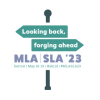Entering this conference, I had goals about what I was I was hoping to hear discussed in the broader national format that MLA | SLA offers. I had—and still have—plans to eventually meander through the whole of the conference offerings, but there’s a purpose up front, something to guide how I ingest the conference material. Although, perhaps a more delicate word to employ would be ‘absorb’, as the follow-up to that thought is how I regurgitate (or again with the delicacy issue ‘share’) the information. My list includes such topics as Artificial Intelligence, liaison-specific like Nursing and Dental, Diversity, Equity, Inclusion & Accessibility, Wellness topics, and more.
For the purpose of this post, I entered ‘Artificial Intelligence’ into the search box which pulled seven presentation options and two vendors that touched on this subject. However, I am a virtual attendee! In this minimally-limiting capacity, I was able to access slides from six presentations and video content from five. What I learned from MLA | SLA 2023 is bulleted below:
- University of Florida/Gainesville has made remarkable strides in proactively broaching this fresh tide and how it will impact research support. Two of the video presentations originated here with only minimal overlap.
- Cool points:
- The University hired over a hundred purpose-specific interdisciplinary faculty to facilitate AI across the campus; one of which was hired for the library – a natural language specialist. Personal opinion: This is mind-boggling and aggressive incorporation effort that makes one wonder how quickly things might shift on other campuses across the nation
- Practical approach to determining information gaps in faculty/staff understanding of AI and potential educational topics to address perceived uncertainty. Personal opinion: Logical approach, question examples AND a list of potential topics detailed. Favorite line: “We wanted to ensure our training materials are absolutely accessible and practical to library employees. We really wanted to make sure that AI is not seen as something that is out of nowhere, very mysterious….”
- While there are a number of different discussions on the scope of Health Data Privacy (HDP) and how it intersects with AI, issues of ethics, algorithmic bias and inconsistencies remain with many advancements (i.e. those glossy, goal-worthy worthy initiatives like diagnostic medical imaging, drug trial analysis and cancer cell identification).
- Not so cool points…
- Health Data Apps are not covered under HIPAA. I made assumptions! Hate it when I have to fess up to that fact. There are only 3 states with a comprehensive biometric privacy laws and 8 with no applicable law to address the issue, even peripherally. To learn more, you might check out the proposed bill that would affect these issues – the American Data Privacy Protection Act
- Tools! Tools! Tools!
- Cool points…
- Work efficiency numbers that varied between 40 and 60 percent were mentioned in two different presentations on the efficacy of AI screening tools in relation to established systematic review processes over the last year.
- Specific tools/processes in the McMasters University presentation were DAISY Re-Rank, Re-Rank Report, and AI Screening
- Something to mull over…
- If a specific query for a PubMed search string is input into Chat GPT 3.5 (the free version) as question prompt, it is capable of grouping terms by concept, with limiters...and even truncation. Keep in mind the use of the word ‘specific’, you must request truncation or a specific field inclusion. How the concept is chunked is inconsistent, some features may be dropped for the inclusion of others and it will change if the same question prompt is input more than once. Another BIG thing to note (and probably one of the more intriguing points to me) is that the AI processing for MeSH terms only includes terms up to September 2021. Personal opinion: This was a valuable 5-minute topic review with the presenter offering an impactful final thought that the more we learn the inconsistencies, the more we are prepared to offer research support and identify issues for patrons who start their search with ChatGPT.
My final conclusions from the presentations and slides is that I need more education on the issues and practices of how AI will intersect with our field. Nothing earth-shaking in that conclusion but perhaps a plea for those of you that do know more to step up for the next annual conference. Give me the how-to applications so that I can understand the benefits and the pitfalls. Show me your initiatives so I can begin grasping what is possible. I would have said it was sci-fi a few years ago. From what I have learned here at MLA | SLA, I know I was simply unaware but doubt I am the only one. And if I am – shh, don’t tell me! I have positive goals here 😉!
For more information, look it up!
Conference sessions referenced:
Library Faculty and Staff Education Program Survey on Artificial Intelligence
Expanding Library-Based Research Support Through Innovative Through Innovative Interdisciplinary Services: Academic Research Consulting & Services (ARCS)
What's New & Exciting in Health Data Privacy Law (If virtual, only slides available)
Learning on the job: Using Artificial Intelligence and Natural Language Processing to support Rapid Review Methods
Machine learning-assisted screening increases efficiency of systematic review
ChatGPT generated PubMed search strings


